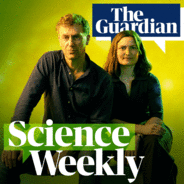Being more flexible than the average person can have its advantages, from being great at games such as Limbo to feeling smug in yoga class. But researchers are coming to understand that being hypermobile can also be linked to pain in later life, anxiety, and even long Covid. Madeleine Finlay hears from the science correspondent Linda Geddes about her experience of hypermobility, and finds out what might be behind its link to mental and physical health. Help support our independent journalism at theguardian.com/sciencepod

Wissenschaft & Technik
Science Weekly Folgen
Twice a week, the Guardian brings you the latest science and environment news
Folgen von Science Weekly
300 Folgen
-
Folge vom 02.04.2024Hypermobility: a blessing or a curse?
-
Folge vom 28.03.2024The virus that infects almost everyone, and its link to cancer and MSOn 28 March it’s the 60th anniversary of the discovery of Epstein-Barr virus, the most common viral infection in humans. The virus was first discovered in association with a rare type of cancer located in Africa, but is now understood to be implicated in 1% of cancers, as well as the autoimmune disease multiple sclerosis, among others. Ian Sample meets Lawrence Young, professor of molecular oncology at Warwick Medical School, to hear the story of this virus, and how understanding it might help us prevent and treat cancer and other illnesses.. Help support our independent journalism at theguardian.com/sciencepod
-
Folge vom 26.03.2024What could a severe solar storm do to Earth, and are we prepared?The sun is currently ramping up to hit the peak of its 11-year activity cycle. In the past few days, powerful solar eruptions have sent a stream of particles towards Earth which are set to produce spectacular auroras in both hemispheres. But these kinds of geomagnetic storms can also have less appealing consequences. Madeleine Finlay speaks to Dr Lisa Upton, a solar scientist at the Southwest Research Institute, about how the mysterious inner workings of the sun create space weather, how solar events can significantly disrupt Earth’s infrastructure, and whether we are prepared for the worst-case scenario. Help support our independent journalism at theguardian.com/sciencepod
-
Folge vom 21.03.2024Havana syndrome: will we ever understand what happened?In late 2016, US officials in Cuba’s capital began experiencing a mysterious and often debilitating set of symptoms that came to be known as Havana syndrome. As two new studies into the condition are published, Ian Sample speaks to the Guardian’s world affairs editor, Julian Borger, who has been following the story, and to the consultant neurologist Prof Jon Stone, about what could be behind the condition. Help support our independent journalism at theguardian.com/sciencepod
